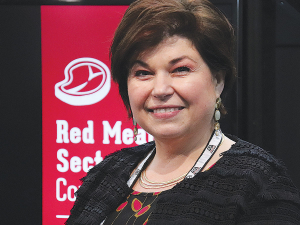Santa's present for the primary sector - an FTA with India
Primary sector leaders have welcomed the announcement of a Free Trade Agreement between India and New Zealand.
 MIA boss Sirma Karapeeva struggles to see how much more automation can be introduced into the meat industry to resolve the present labour shortages.
MIA boss Sirma Karapeeva struggles to see how much more automation can be introduced into the meat industry to resolve the present labour shortages.
Meat Industry Association (MIA) boss Sirma Karapeeva says she struggles to see how much more automation can be introduced into the meat industry to resolve the present labour shortages.
Karapeeva says many people seem to think that automation is the silver bullet that can compensate for labour shortages in the industry caused by the Covid-19 pandemic.
"I struggle to see how that is possible. In the red meat sector, we have already done all that we can do in terms of the lower hanging fruit in automation," she told Rural News.
"The big pieces of automation are already in place and the next areas of automation that could be developed are really challenging because you are dealing with the natural product - meat."
Karapeeva says while it's possible to cut out a widget based on a computer program, it is much more complicated to get a computer to cut a product such as meat. She says there may be an opportunity in the future, but at the moment the industry is having to focus on the immediate labour shortages and can't buy into the idea of further automation.
She also notes that innovation and automation are often confused, but in fact they are quite different things, with innovation often related to streamlining business processes within a company.
The issue that worries Karapeeva the most is that of labour shortages. She says this is the number one issue for the meat industry and she's grateful that the Government has rolled over the current visas for overseas workers for the next two years, which means that the crisis is not so imminent.
"But the idea of rolling over visas is not sustainable and does not give the companies the certainty to plan their production cycles," she adds. "We want to sit down with the Government and find a sustainable, long term solution that will give us certainty and will allow companies to plan."
Karapeeva points out that if the industry is unable to recruit halal slaughterers from overseas, it will devalue the carcass of the animal, impact on company profitability, reduce the value of NZ exports and affect returns to farmers.
One of New Zealand’s longest-running pasture growth monitoring projects will continue, even as its long-time champion steps away after more than five decades of involvement.
The Insurance & Financial Services Ombudsmen Scheme (IFSO Scheme) is advising consumers to prepare for delays as insurers respond to a high volume of claims following this week's severe weather.
Additional reductions to costs for forest owners in the Emissions Trading Scheme Registry (ETS) have been announced by the Government.
Animal welfare is of paramount importance to New Zealand's dairy industry, with consumers increasingly interested in how food is produced, not just the quality of the final product.
Agriculture and Forestry Minister Todd McClay is encouraging farmers and growers to stay up to date with weather warnings and seek support should they need it.
The closure of SH2 Waioweka Gorge could result in significant delays and additional costs for freight customers around the Upper North Island, says Transporting New Zealand.

OPINION: If the hand-wringing, cravat and bow-tie wearing commentariat of a left-leaning persuasion had any influence on global markets, we'd…
OPINION: With Winston Peters playing politics with the PM's Indian FTA, all eyes will be on Labour who have the…